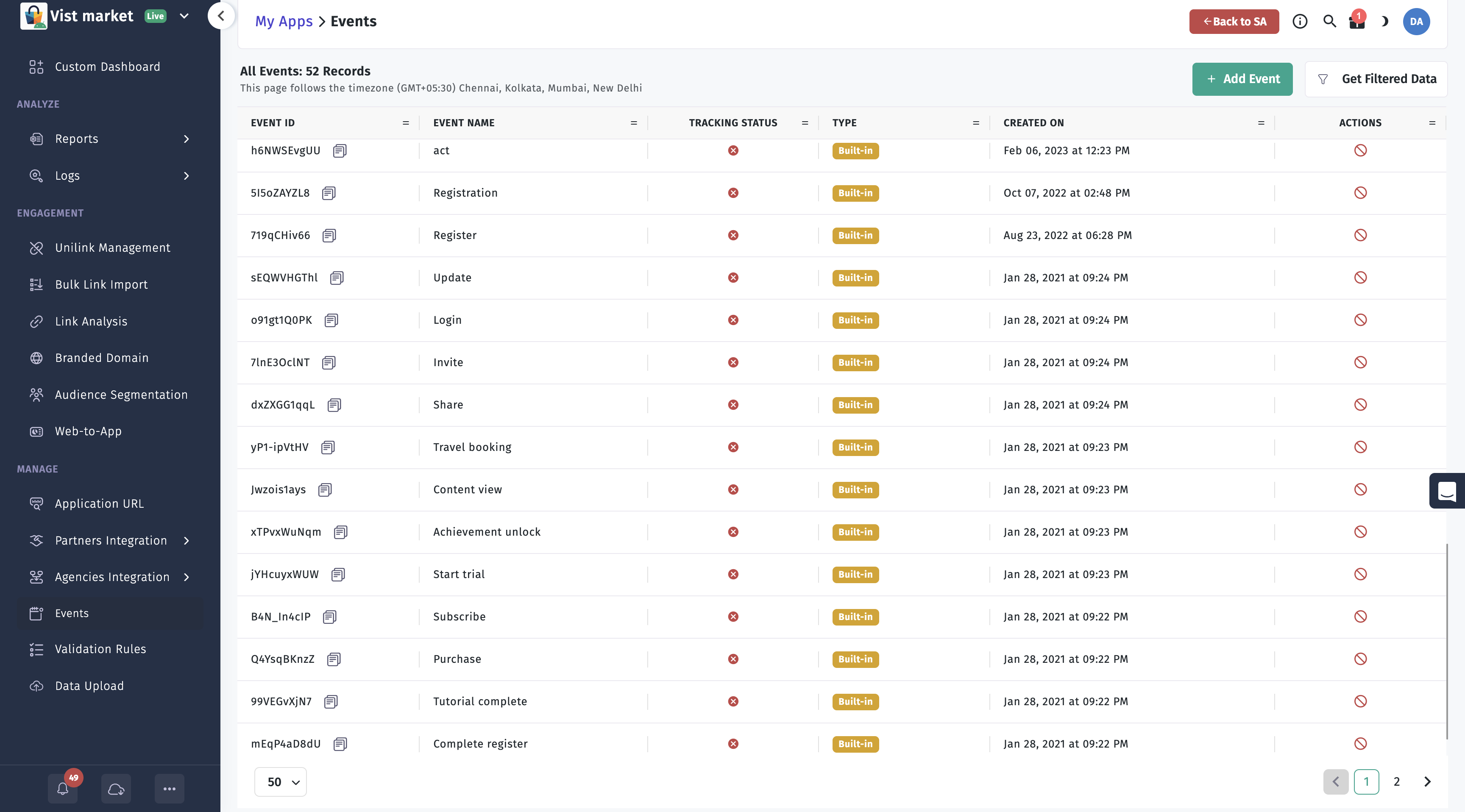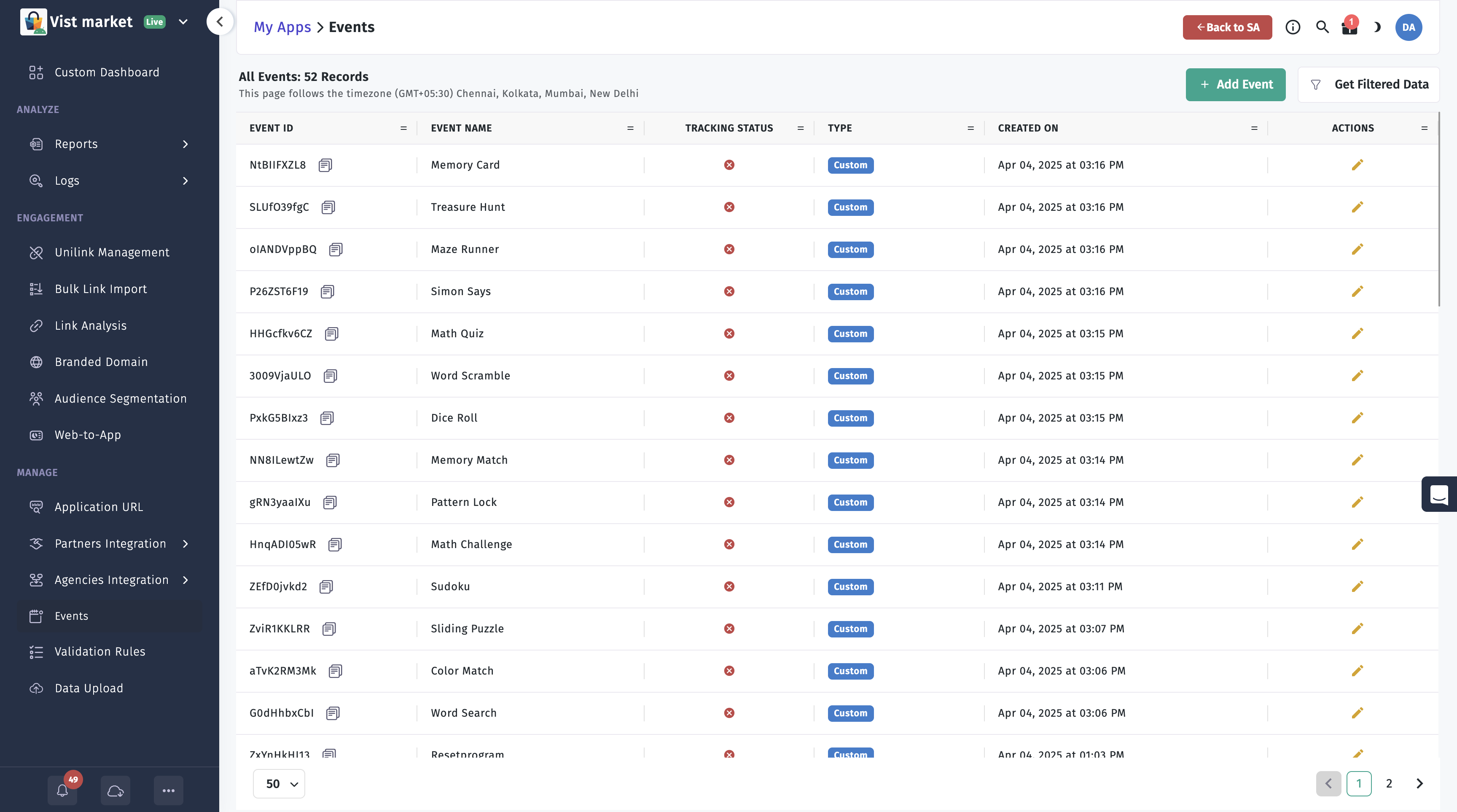Overview
This guide provides instructions for tracking user interactions in your Expo application using the Apptrove SDK's TrackierEvent object. Event tracking offers insights into how users engage with your app, supporting both built-in and custom events.
Prerequisites
- Access to the Trackier Panel for configuring custom events
- Basic knowledge of React Native/Expo development
- Apptrove Expo SDK installed and initialized in your project
Event Tracking
The Apptrove SDK provides a TrackierEvent object to structure and send event information from your app to Trackier servers. Events can be triggered by user actions, such as button clicks, and support both built-in and custom configurations.
1. Built-in Events
Built-in events are predefined constants available on the Trackier dashboard. You can implement these events directly in your app to track common user interactions.

Supported Built-in Events
LOGINUPDATEPURCHASESUBSCRIBESTART_TRIALACHIEVEMENT_UNLOCKEDCONTENT_VIEWTRAVEL_BOOKINGSHAREINVITEADD_TO_CARTADD_TO_WISHLISTCOMPLETE_REGISTRATIONTUTORIAL_COMPLETIONLEVEL_ACHIEVED
In-built Parameters
You can include additional data with events using the following parameters:
param1,param2,param3,param4,param5,param6,param7,param8,param9,param10revenuecurrencyorderIddiscountcouponCodeev(for custom key-value pairs)
The argument passed to the TrackierEvent class is the event ID (e.g., TrackierEvent.LOGIN for built-in events).
Usage
Create a TrackierEvent instance and trigger it on a user action, such as a button click. Below are examples for tracking a LOGIN event.
Track Event Example
import { TrackierConfig, TrackierSDK, TrackierEvent } from 'trackier-expo-sdk';
function trackLoginEvent() {
// Below are the example of built-in events function calling
// The arguments - "TrackierEvent.LOGIN" passed in the Trackier event class is Events id
const event = new TrackierEvent(TrackierEvent.LOGIN);
/* Below are the function for the adding the extra data,
You can add the extra data like login details of user or anything you need.
We have 10 params to add data, Below 5 are mentioned */
event.param1 = "Param 1";
event.param2 = "Param 2";
event.param3 = "Param 3";
event.param4 = "Param 4";
event.param5 = "Param 5";
// Set additional event properties
event.orderId = "order123";
event.discount = 10.0;
event.couponCode = "SAVE10";
TrackierSDK.trackEvent(event);
console.log("Login event tracked");
}
2. Custom Events
Custom events are defined in the Trackier dashboard and identified by unique event IDs. Use these to track app-specific interactions not covered by built-in events.

Usage
Create a TrackierEvent instance with the custom event ID from the Trackier dashboard and trigger it as needed.
import { TrackierConfig, TrackierSDK, TrackierEvent } from 'trackier-expo-sdk';
function trackCustomEvent() {
// Below are the example of customs events function calling
// The arguments - "sEMWSCTXeu" passed in the event class is Events id
const event = new TrackierEvent("sEMWSCTXeu");
/* Below are the function for the adding the extra data,
You can add the extra data like login details of user or anything you need.
We have 10 params to add data, Below 5 are mentioned */
event.param1 = "Param 1";
event.param2 = "Param 2";
event.param3 = "Param 3";
event.param4 = "Param 4";
event.param5 = "Param 5";
TrackierSDK.trackEvent(event);
console.log("Custom event tracked");
}
3. Complete Event Tracking Example
This comprehensive example demonstrates how to track a COMPLETE_REGISTRATION event with all available parameters, user data, and custom attributes.
import { TrackierConfig, TrackierSDK, TrackierEvent } from 'trackier-expo-sdk';
function trackCompleteRegistration() {
// Note: Ensure TrackierSDK.initialize is called before tracking events.
// Create event with COMPLETE_REGISTRATION ID
const event = new TrackierEvent(TrackierEvent.COMPLETE_REGISTRATION);
// Alternatively : const event = new TrackierEvent("w43424"); // Pass your Event ID
// Built-in fields
event.orderId = "REG_001";
event.currency = "USD";
event.couponCode = "WELCOME10";
event.discount = 5.0;
event.revenue = 0.0; // free signup in this case
// Custom parameters for structured data
event.param1 = "Test1"; // String: Dummy value
event.param2 = "Test2"; // String: Dummy value
event.param3 = "Test3"; // String: Dummy value
event.param4 = "Test4"; // String: Dummy value
event.param5 = "Test5"; // String: Dummy value
event.param6 = "Test6"; // String: Dummy value
event.param7 = "Test7"; // String: Dummy value
event.param8 = "Test8"; // String: Dummy value
event.param9 = "Test9"; // String: Dummy value
event.param10 = "Test10"; // String: Dummy value
// Custom key-value pairs for flexible data
event.setEventValue("signup_time", 1631234567890); // Number: Timestamp
event.setEventValue("sdk", "ExpoNative"); // String: Device type
// Custom data (ev map)
event.ev = {
signup_time: Date.now(),
device: "Expo-ReactNative",
referral: "Campaign_XYZ",
};
// Attach user details
TrackierSDK.setUserId("USER12345");
TrackierSDK.setUserEmail("user@example.com");
TrackierSDK.setUserName("Jane Doe");
TrackierSDK.setUserPhone("+1234567890");
TrackierSDK.setIMEI("123456789012345", "987654321098765");
TrackierSDK.setMacAddress("00:1A:2B:3C:4D:5E");
// Additional user details
var jsonData = {"phone": "+91-8137872378" , "name": "Embassies"};
TrackierSDK.setUserAdditionalDetails("data", jsonData)
// Send event
TrackierSDK.trackEvent(event);
}
4. Revenue Events
Revenue events track in-app revenue, including the amount and currency, to monitor app monetization.
Usage
Create a TrackierEvent instance, set the revenue and currency fields, and trigger the event.
import { TrackierConfig, TrackierSDK, TrackierEvent } from 'trackier-expo-sdk';
function trackRevenueEvent() {
// Below are the example of customs events function calling
// The arguments - "sEMWSCTXeu" passed in the event class is Events id
const event = new TrackierEvent("sEMWSCTXeu");
// Passing the revenue events be like below example
event.revenue = 2.5; // Pass your generated revenue here.
event.currency = "USD"; // Pass your currency here.
TrackierSDK.trackEvent(event);
console.log("Revenue event tracked");
}
5. Custom Parameters in Events
You can pass additional custom parameters using a JavaScript object, which is assigned to the ev field of the TrackierEvent object.
Usage
Create a JavaScript object, add custom parameters, and assign it to the event's ev field before tracking.
import { TrackierConfig, TrackierSDK, TrackierEvent } from 'trackier-expo-sdk';
function trackCustomParamsEvent() {
// Below are the example of customs events function calling
// The arguments - "sEMWSCTXeu" passed in the event class is Events id
const event = new TrackierEvent("sEMWSCTXeu");
// Passing the extra data through customs params
const eventCustomParams = {
customParam1: "xxxxxx",
customParam2: "xxxxxx"
};
event.ev = eventCustomParams; // Pass the reference to the ev
TrackierSDK.trackEvent(event);
console.log("Custom params event tracked");
}
6. Enhanced Event Properties
You can set additional event properties for more detailed tracking:
import { TrackierConfig, TrackierSDK, TrackierEvent } from 'trackier-expo-sdk';
function trackEnhancedEvent() {
const event = new TrackierEvent(TrackierEvent.PURCHASE);
// Set basic event parameters
event.param1 = "Product Category";
event.param2 = "Product Brand";
event.param3 = "Product Model";
// Set enhanced properties
event.orderId = "order_12345";
event.discount = 15.50;
event.couponCode = "SUMMER2024";
event.revenue = 99.99;
event.currency = "USD";
// Set custom event values using setEventValue method
event.setEventValue("user_segment", "premium");
event.setEventValue("purchase_method", "credit_card");
event.setEventValue("campaign_source", "facebook");
TrackierSDK.trackEvent(event);
console.log("Enhanced event tracked");
}
You can pass user information along with events to enhance tracking and personalization:
import { TrackierConfig, TrackierSDK, TrackierEvent } from 'trackier-expo-sdk';
function trackEventWithUserData() {
const event = new TrackierEvent(TrackierEvent.ADD_TO_CART);
// Set user information
TrackierSDK.setUserId("user123");
TrackierSDK.setUserEmail("user@example.com");
TrackierSDK.setUserName("John Doe");
TrackierSDK.setUserPhone("1234567890");
// Set additional user details
const additionalData = {
age: "25",
gender: "male",
location: "New York",
preferences: ["sports", "technology"]
};
TrackierSDK.setUserAdditionalDetails("data", additionalData);
TrackierSDK.trackEvent(event);
console.log("Event tracked with user data");
}
Event Parameters
The TrackierEvent object supports various parameters for detailed tracking:
- param1, param2, param3, param4, param5: Custom parameters for event-specific data
- revenue: Revenue amount (for revenue events)
- currency: Currency code (e.g., "USD", "EUR")
- orderId: Order identifier for purchase events
- discount: Discount amount applied to the transaction
- couponCode: Coupon code used in the transaction
- ev: Custom JSON data for additional event information
- setEventValue(key, value): Method to set custom key-value pairs for enhanced tracking
Best Practices
- Consistent Event Names: Use consistent naming conventions for your custom events
- Meaningful Parameters: Include relevant data in event parameters for better analytics
- User Privacy: Ensure you have user consent before tracking personal information
- Error Handling: Wrap event tracking calls in try-catch blocks to handle errors gracefully
- Testing: Test event tracking on both Android and iOS devices
- Documentation: Keep a record of all custom events and their purposes
Next Steps
After implementing event tracking:
- Verify events are appearing in your Trackier dashboard
- Implement advanced features like deep linking and uninstall tracking
- For assistance, contact Trackier support at support@trackier.com